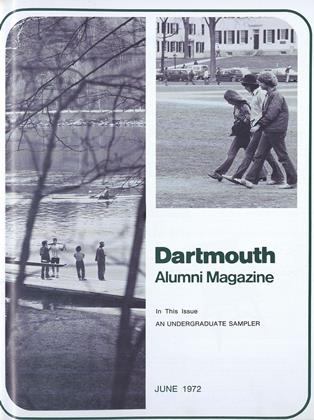The general faculty of the College, at a May 10 meeting, agreed to allow students to rearrange their normal academic studies in order to engage, as conscience dictates, in protests against the escalation of the Indochina war.
However, the faculty stipulated that "necessary alternate arrangements for satisfying course requirements and teaching responsibilities shall be made between individual students and faculty members and must be agreed upon in writing by May 17."
The stipulation of a date of agreement was approved by a vote of 100-61 to assure that students and faculty members participate in activities for reasons of conscience and that they make adequate arrangements for fulfilling their academic and teaching requirements.
The faculty, meanwhile, defeated 93-67 a resolution urging "all members of the Dartmouth Community to participate in activities directed against" the escalation of the war. At the same time, by a voice vote, the faculty adopted a resolution deploring "the President's escalation of the war in Southeast Asia" and urged "the immediate withdrawal of all American military forces from Indochina."
The faculty also defeated efforts to suspend classes for two days and to direct President Kemeny to authorize the mailing of a faculty letter to all alumni urging graduates of the College to do what they can to help bring an end to the war.
By action of the Executive Committee of the Faculty of Arts and Sciences, which was convened to settle differing opinions as to just what the general faculty vote meant, the right to request a grade of "incomplete" was granted to undergraduates electing to interrupt studies in order to honor a commitment to activities related to the Indochina war. The right was granted with the understanding that for each course the faculty member would specify to the Dean of the College the date by which course work would have to be completed for credit. No incompletes may be extended beyond September 1, 1972.
Local activity protesting the escalation of the war in Vietnam consisted mainly of peaceful mass meetings, petitions, and demonstrations by students, faculty, and townspeople at CRREL and draft headquarters in Lebanon, and at Pease and Westover Air Force Bases. More than 80 "civil disobedience" arrests were made during the first few days of the anti-war demonstrations.
President Kemeny joined the other Ivy League college presidents and the president of M.I.T. in a joint public statement deploring the escalation of the war, calling for an early end to U. S. involvement, and urging that protests be peaceful and not disruptive of regular college work.
Perhaps the strongest faculty and student activity was solicitation of signatures on a petition to Congress to impeach President Nixon (H.R. 976) for ignoring the Constitutional restrictions on the President's powers to make war.
Members of the Faculty Caucus and individual faculty members who gave direction to the May anti-war program included Professors Hoyt Alverson, Gene Garthwaite, John Lamperti, John Lanzetta, Arthur Luehrmann, Hans Penner, and Thomas Roos. Plans are being made to have these or other faculty members meet with reunion classes this month to discuss the strong feeling at Dartmouth against the war.
 View Full Issue
View Full Issue
More From This Issue
-
 Feature
FeatureThe Future of Liberal Arts Education at Dartmouth
June 1972 -
 Feature
FeatureDartmouth Men and the World: Three Views
June 1972 By ALBERT H. CANTRIL '62 I, THOMAS F. BOUDREAU '62 -
 Feature
FeatureRETIRING FACULTY
June 1972 -
 Feature
FeatureWhitman at Dartmouth—100 Years Ago
June 1972 -
 Feature
FeatureUNDERGRADUATE SAMPLER
June 1972 -
 Article
ArticleThe Myth of the Munich Analogy
June 1972 By STEPHEN C. THEOHARIS '71








